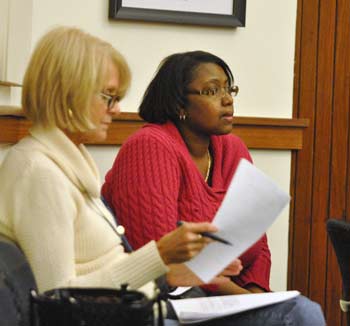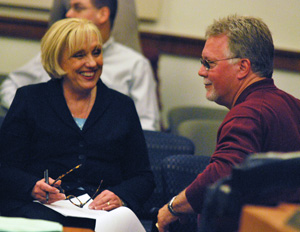Washtenaw County board of commissioners special working session (Jan. 3, 2013): In a wide-ranging discussion – driven in large part by Ann Arbor Democrat Conan Smith – county commissioners addressed how the recent state right-to-work legislation might impact Washtenaw County’s economy as well as the employees of county government.

Nancy Heine, president of AFSCME Local 3052, Caryette Fenner, president of AFSCME Local 2733, the county government’s largest union. (Photos by the writer.)
The working session included presentations by one of the county’s Lansing lobbyists; labor attorney Paul Gallagher; and Mary Kerr – president of the Ann Arbor Convention & Visitors Bureau. Kerr told commissioners that Washtenaw County brings in an estimated $12 million annually from the training conferences held here by three major unions. She said the CVB – which is funded through an accommodations tax levied by the county – will work to ensure that the unions feel welcome, but she has not had any conversations yet to gauge their reactions to the new right-to-work law.
Gallagher was less circumspect, saying he’s concerned about the potential loss of business if unions decide to move their training to a state that doesn’t have right-to-work laws.
The Michigan legislation – supported by the Republican-controlled House and Senate and Republican Gov. Rick Snyder – made it illegal to require employees to support unions financially as a condition of their employment. It’s viewed by Democrats as a way to undercut support for labor organizations that have historically backed the Democratic Party. On the Washtenaw County board of commissioners, seven of the nine commissioners are Democrats.
The legislation, which will take effect in March of 2013, received national attention and followed a failed ballot initiative by labor to protect collective bargaining rights in the state Constitution. That effort – Proposal 12-2 – was not supported by a majority of voters in the Nov. 6 election.
At the Jan. 3 working session, Conan Smith questioned Gallagher about details of state and federal labor laws, exploring the latitude that the county might have in supporting unions that represent 85% of the 1,321 employees in county government. He floated several ideas that commissioners might consider pursuing.
For example, most current union contracts expire on Dec. 31, 2013. Because the right-to-work law doesn’t take effect until March of this year, the county has until then to work with the unions and possibly extend their contracts beyond the end of 2013. If that happens before March, then the unions could continue to collect “agency fees” from employees who don’t want to join the union but who are still part of the bargaining unit that the union represents. Though the practice would be illegal for future contracts, it could remain in place for the duration of the extended agreements.
Additionally, Smith said there are items in the union contracts that might set the stage for a division of employees into three distinct groups. Two of those groups exist now: (1) unionized employees, and (2) non-union management employees. There’s the potential for a third group, Smith said: Non-union, non-management workers who have made the choice to opt-out of the union and the benefits that the union provides, be it economic, social, protective or anything else. Those benefits, in his opinion, shouldn’t accrue “to those people who don’t pay to play.”
Smith told commissioners: “I hope we are comparatively aggressive in our stance of supporting our labor partners and finding innovative ways that we can test this new world.” He hopes to make sure that the benefits of union membership are clear before people make the decision about whether to join. The point is not to coerce them to join or discourage them from joining, he said, but just to make sure they understand very clearly what opportunities they have as union members.
Smith said there are a number of places in the current union contracts where the county can make that “imminently clear.” And there are a number of places in the county’s practices where they can make that clear, too, he said. “I think if we do that through practice, undoubtedly we’ll be challenged – and I for one am quite comfortable taking that challenge forward and being the test case to determine the extent to which this law applies to our public employees.”
Smith – who is married to state Sen. Rebekah Warren – does not believe the majority of legislators would be willing to amend the right-to-work law, and that lobbying them to do so would probably be a waste of time.
Commissioners also heard from two labor leaders on Jan. 3: Caryette Fenner, president of the American Federation of State, County and Municipal Employees, AFL-CIO (AFSCME) Local 2733, the county government’s largest union with about 700 members; and Nancy Heine, president of AFSCME Local 3052, which represents about 50 supervisors. Both Fenner and Heine expressed concerns amid an uncertain future. “What could potentially happen with this law is that it will render us useless,” Heine said. “We will have no resources to defend any of our members.”
It’s unclear how far the majority of commissioners would be willing to go in challenging the right-to-work law. At the Jan. 2 board meeting, the two Republican commissioners – Dan Smith and Alicia Ping – indicated they did not want to debate the issue. However, there was more clear support for sending a signal to the labor unions that do their training in Washtenaw County that they are welcome here. Andy LaBarre, who led his first meeting as chair of the working session, offered to draft a resolution to that effect for the board to consider. [Full Story]






